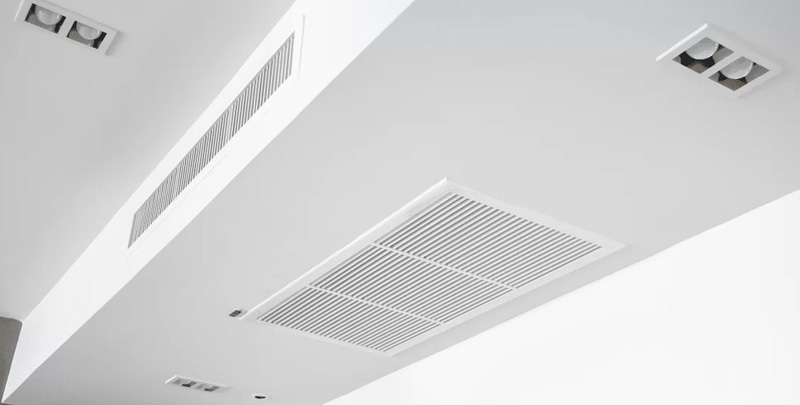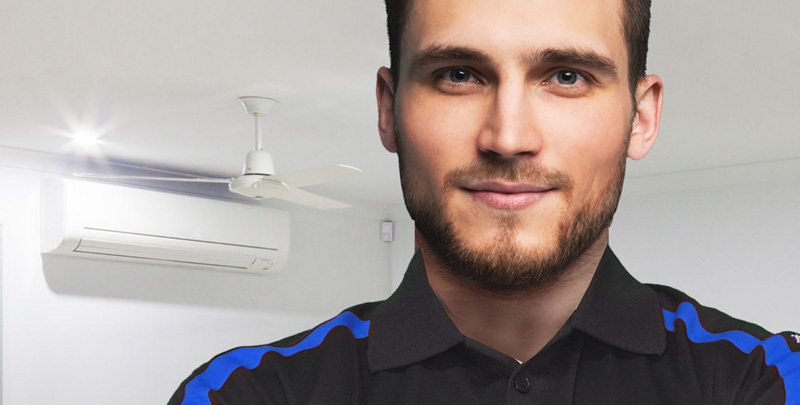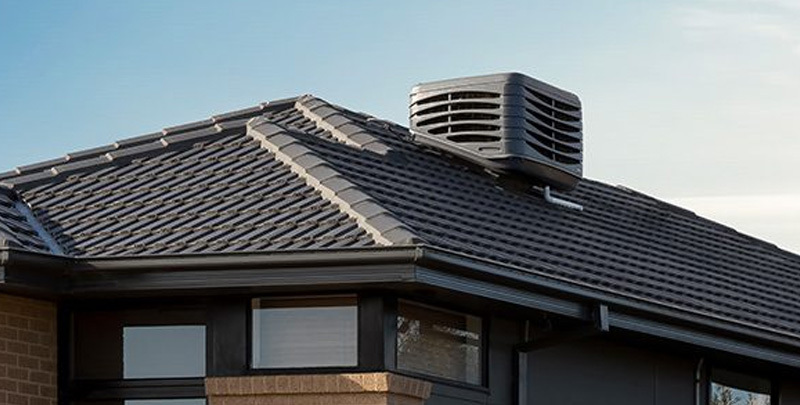When battling the dog days of summer, nothing feels better than a breath of cool air. But how do we achieve this refreshing escape from the heat?
Two popular cooling solutions are the evaporative cooling system and the air conditioning system.
Let’s delve deeper into evaporative cooling vs air conditioning.
Taking the Heat: Evaporative Cooling Defined
Evaporative cooling is an ancient method of temperature control that harnesses nature’s evaporation process to cool the air.
The Mechanics of Evaporative Cooling
An evaporative cooler, colloquially known as a swamp cooler, works by drawing hot air from the outside into a cooling unit.
This warm air is then passed over water-soaked cooling pads located in the evaporative cooling system. The heat causes the water to vaporise, causing the air temperature to reduce significantly before it’s circulated back into the room.
Essentially, evaporative coolers rely on the exchange of warm air for cool air.
Pros and Cons of Evaporative Cooling Systems
Evaporative cooling systems inherently come with a set of advantages and disadvantages based on their technology and working principles.
Advantages of Evaporative Cooling
- Energy efficiency: Evaporative coolers consume less energy as compared to traditional air conditioners. They simply use a fan and water pump, reducing energy consumption.
- Continuous fresh air: Evaporative cooling draws in fresh outdoor air rather than recirculating indoor air. This helps in maintaining better indoor air quality.
- Lower carbon footprint: Because of their lower energy requirements, evaporative coolers release fewer greenhouse gas emissions, contributing to a lower carbon footprint.
- Cost-effectiveness: Evaporative coolers tend to be less expensive to install and run than conventional air conditioning systems.
- Humidity control: In dry climates, evaporative coolers can regulate humidity levels by introducing some moisture into the air.
Disadvantages of Evaporative Cooling
- Weather dependent: The effectiveness of an evaporative cooler is dependent on the outside humidity level. In areas with high humidity, the performance of evaporative coolers diminishes as the air is already saturated, limiting the evaporation process.
- Water usage: Since they operate on evaporation of water, they could utilise a significant amount of water, especially in large spaces.
- Limited cooling capacity: While evaporative coolers can efficiently reduce temperatures, their cooling potential is generally less than that of air conditioning systems, especially in conditions of extreme heat.
- No temperature precision: Unlike air conditioners, you cannot set a specific temperature with evaporative coolers.
- Maintenance: Evaporative coolers require regular cleaning and maintenance of their water reservoirs and cooling pads to ensure efficient operation and prevent potential health hazards, such as mould and bacteria growth.
Chasing the Chill: Air Conditioning Explained
Air conditioning, by contrast, uses a different process to cool indoor environments.
How Air Conditioning Works
A traditional air conditioner or a split system air conditioner works by transferring heat from inside a room to the outdoors. Air conditioning units contain a refrigerant gas inside their coils, which absorbs heat when indoor air is blown over them.
This transforms the hot air into cold air, which is then circulated back into the room by the indoor unit.
Pros and Cons of an Air Conditioner
The air conditioning system, whether it’s a traditional unit, refrigerated air conditioner, or split system air conditioner, also has its own set of advantages and disadvantages.
Advantages of Air Conditioning
- Effective temperature control: Air conditioners allow for precise control over your indoor climate. You can set a desired temperature, and the unit will cool (or heat, in the case of reverse-cycle systems) your space to achieve it.
- Humidity reduction: In addition to cooling, air conditioners also lower humidity levels in your home, which can be particularly beneficial in humid climates.
- Consistent performance: Unlike evaporative coolers, air conditioners operate effectively regardless of external humidity levels, delivering reliable performance irrespective of the weather.
- Air quality improvement: Many air conditioners contain filters that can trap airborne particulates like dust, pollen, and other allergens, thus improving the quality of indoor air.
Disadvantages of Air Conditioning
- Energy consumption: Air conditioners typically consume more energy than evaporative coolers, which can lead to higher electricity bills.
- Environmental impact: Traditional air conditioners use refrigerant gases to cool the air. While modern units have better environmental profiles, these gases can still contribute to greenhouse gas emissions.
- Recirculated air: Unlike evaporative coolers, which continually bring in fresh outdoor air, air conditioners largely recirculate the existing indoor air, which might lead to stuffiness over time.
- Maintenance and costs: Air conditioning units can be expensive to install and maintain, and should any refrigerant gas leak, the expense can be considerable to repair this.
- Health ramifications: As air conditioners remove moisture from the air, they can cause dryness of skin and eyes, and may exacerbate respiratory complaints in some people.
Evaporative Cooling vs Air Conditioning: The Great Debate
One system is not categorically better than the other; the answer to “evaporative cooling vs air conditioning” depends on user needs and contexts.
Is an evaporative cooler better than an air conditioner? It could be if you live in a dry climate, would like to keep windows open, and prefer more energy-efficient, economical cooling solutions.
Conversely, air conditioners provide an edge in climates with high humidity and when precise temperature control is needed. Also, with a split system air conditioner, it’s possible to utilise only the fan for ‘air circulation only’ mode when cooling is unnecessary, saving on running costs.
When to Use Each System
Below is a more detailed description of when and where to use evaporative cooling or air conditioning systems:
When to Use Evaporative Cooling
- Dry, hot climates: Evaporative coolers work best in arid climates like those found in certain parts of Western Australia or South Australia. These areas often have high heat but low humidity, perfect for this type of cooling.
- Ventilation requirement: If you prefer fresh air circulation and desire to keep windows and doors open, evaporative cooling is a good choice as it continuously flushes and circulates fresh air into the space.
- Energy efficiency: If you wish to reduce your carbon footprint and save on energy costs, evaporative coolers are a more energy-efficient option compared to conventional air conditioning systems.
- Need to increase humidity: In areas with dry air that can lead to discomfort or health problems due to low humidity, evaporative cooling is an excellent choice as it adds moisture to the air.
When to use Air Conditioning
- Humid climates: In humid environments, like those found in northern parts of Australia or coastal regions, where the air already contains high levels of moisture, air conditioning is the more efficient choice. Traditional air conditioners reduce humidity while cooling the air.
- Precise temperature control: If you desire a specific temperature, air conditioning systems allow for precise temperature settings, unlike evaporative coolers.
- Enclosed spaces: In spaces where the windows and doors need to be kept closed most of the time, air conditioning units work best as they circulate the existing indoor air.
- All-weather suitability: If your region experiences varied climates, with cold winters, an air conditioner with a heating function (reverse cycle air conditioner) can provide cooling in summer and heating in winter, making it a versatile year-round option.
Which system wins for the air conditioning – evaporative cooling debate often boils down to your specific needs and circumstances. While evaporative coolers are fantastic for fresh air and energy efficiency in dry heat, air conditioning systems provide effective cooling and humidity control in varied climates and closed spaces. Always consider professional advice to find the best cooling solution for your needs.

Consult a Seasoned Professional
Given the varying needs of different environments and seasons, it can be helpful to seek professional advice when choosing between evaporative cooling vs air conditioning. A professional in climate control can guide you through selecting the most economical cooling solutions for you, considering factors such as your locale’s weather, professional units like ducted systems, evaporative cooling technology, and power consumption.
Ultimately, whether you prefer to have cooled air with evaporative cooling or beat the heat with an air conditioning unit, your choice should hinge on your cooling needs, your concern for energy efficiency, and the climate of your locale. A specialist in cooling systems will ensure you achieve the perfect balance of comfort and efficiency for your home or office.
Either with a cool burst of air from an evaporative cooler or a steady stream of chilled air from a traditional air conditioner, beating the heat doesn’t have to be a sweaty dilemma! Choose wisely and keep cool when the heat is on.
Please note: This information is provided for advice purposes only. Regulations differ from state to state, so please consult your local authorities or an industry professional before proceeding with any work. See our Terms & Conditions here.


